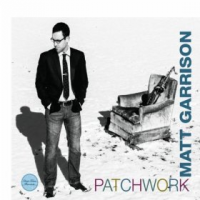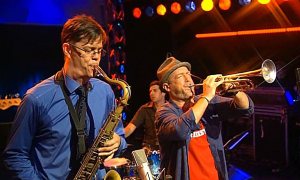Home » Jazz Articles » Genius Guide to Jazz » How to Win Friends and Influence People to Jazz
How to Win Friends and Influence People to Jazz
But I digress.
In the 18 months I've been chewing valuable server space on AAJ, I have endeavored to provide an authoritative introduction to jazz as well as in depth explorations of the instruments and personalities that have contributed to make jazz what it is today. For those of you who have followed the Guide from the beginning, you now have enough collected jazz knowledge to earn an associate's degree or some such damned useless piece of paper if you're into that sort of thing.
I have long believed that the best way to spread jazz is virally, from person to person (or by spiking community water supplies with Coltrane CD's) That means that it is the responsibility of everyone who loves jazz to spread the music to any and all. But how? you ask, pulling at my lapels with wild-eyed desperation like some hopped-up dope fiend in a bad fifties movie where the fresh-faced girl-next-door falls in with the wrong crowd and eventually ends up with a social disease.
Just then.
Warning: The following paragraph contains a reference to Ken Burns.
To introduce the neophyte to jazz is a delicate thing. Should you take the Ken Burns (told you) approach and begin at the beginning with the very roots of jazz, or start by introducing them to the most accessible jazz and gently edging them on from there? Should you simply share your own favorite music and hope that they enjoy it as much as you do? Or should you just say "To hell with it" and point them to the Genius Guide, leaving me to do all the heavy lifting?
Some friends you are.
I could put the ball back in your court and just wind this column up right here by popping a link to the first Genius Guide (Prelude, April 2001), leaving you to travel the course on your own. What with my grueling writing schedule (three words a day, like clockwork), I think I've earned some rest. By rights, I should wrap the whole thing up here and now and just go kick back in my recliner for a well-deserved nap.
But I won't.
One of the benefits of having your Own Personal Genius is knowing that I will always be here to provide answers and guidance, regardless of the personal toll on me as a man. Sure, I'd much rather be sipping Chianti and playing Scrabble in the apartment of a pajama-clad überblonde who hasn't yet figured out that my bizarre and erratic personality isn't just a charming eccentricity, but a legitimate cause to alert public health officials. Yet, here I am, dutifully at my post once again.
So then.
Introducing jazz to a neophyte can be a tricky thing. Some people have a preconceived notion of jazz as some sort of highbrow mood music played by ponytailed men in designer sweaters for people who have a favorite brand of water. Some people think of jazz as aimless noodling, musical nonsense. Some people think of jazz as a rich, creamy, slightly piquant condiment that works with a variety of dishes; but these people are thinking of bearnaise sauce and have no business being allowed anywhere near jazz.
For those who think of jazz as the exclusive domain of the intellectual, the best approach is to begin with the earthy roots of the music. Jazz was born a polyglot combination of disparate influences among the common people, and grew in popularity as an alternative music to the hokey, sentimental popular songs of the time. Jazz was the punk of its day, a dangerous noise from the edges of society. Louis Armstrong was just as threatening to middle America in 1927 as Johnny Rotten was in 1977.
While it is true that jazz fans tend to be smarter than average (smarter, and more attractive), it is not in the best interest of the music that it be relegated to a strictly elitist art. Jazz, at its best, carries the universality of human emotion to the heart more directly than any other music. Coming from its greatest voices, it is the distilled essence of being. Jazz is probably the most human of music, because the rules of music bend to the artist rather than vice versa. And, perhaps most significantly, the right jazz has the ability to loosen undergarments faster than anything Barry White ever recorded.
In summary, the way to overcome the impression that jazz is for highbrows rests in five simple words: Jazz can get you laid.
A similar impression of jazz is that it is indecipherable noise. This idea comes mainly from the fact that the instruments within a jazz ensemble don't always behave in the expected manner. The drums don't always maintain a comforting boom chick boom chick to mark the time in precise, even measures. The bass isn't content to confine itself to the first and fifth of the scale. The piano sometimes plays jangling, discordant clusters of notes rather than soothing streams of agreeable tones. Soloists aren't bound to the immediate notes of the melody, or even the corporate notes of the underlying chords. The comforting sameness of popular music is nowhere to be found, and the tinselly blandishments that decorate endless rows of indistinguishable pop stars are equally absent.
To win this sort of person over to jazz, it is necessary to take them inside the music. They must understand the absolute freedom of jazz, the dedication to individual expression even within a group dynamic that makes jazz completely unique among types of music. Introduce them to the personalities involved, how individual contributions came together to create a new entity. Illustrate the differences between the wonderfully unique people who created jazz and the faceless flavors-of-the-month that populate the landscape of top forty music.
In summary, the way to overcome the impression that jazz is just random noise is to explain the people who created, prospered, and perpetuate it. And on a side note, $50 says that Diana Krall could take Britney Spears in a fair fight.
For the absolute newbie—that is, someone who has no opinion of jazz whatsoever'it is only necessary to share your favorite music, and your enthusiasm, with them. How often have all of us been exposed to something we might not have liked otherwise and convinced of its merits by someone whose opinion we trust and respect? Be careful, however, not to come on too strong. The lure of seduction is the best path to disarm the sure resistance to the unfamiliar. How do you think I got into the überblonde's apartment in the first place?
My point exactly.
In summary, the quickest way to get jazz to the heart of a newbie is to send it from yours.
So there you have it, a few handy tips for overcoming preconceived notions of jazz and for bringing it to fresh ears. And in the bargain, a neat lesson in how to coast through a perfectly passable monthly column without an ounce of inspiration or a single original thought in your head. This is why I am a Genius.
Till next month, kids, exit to your right and enjoy the rest of AAJ.
Tags
PREVIOUS / NEXT
Support All About Jazz
 All About Jazz has been a pillar of jazz since 1995, championing it as an art form and, more importantly, supporting the musicians who make it. Our enduring commitment has made "AAJ" one of the most culturally important websites of its kind, read by hundreds of thousands of fans, musicians and industry figures every month.
All About Jazz has been a pillar of jazz since 1995, championing it as an art form and, more importantly, supporting the musicians who make it. Our enduring commitment has made "AAJ" one of the most culturally important websites of its kind, read by hundreds of thousands of fans, musicians and industry figures every month.
























